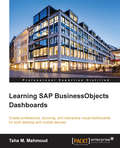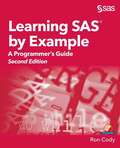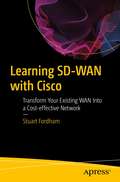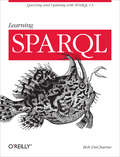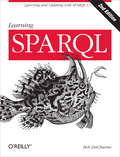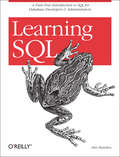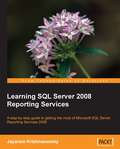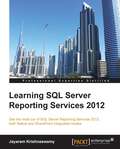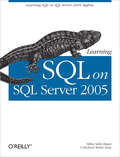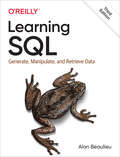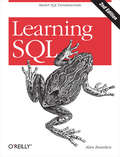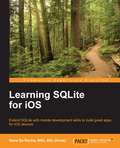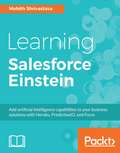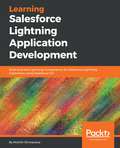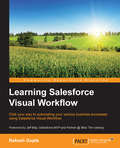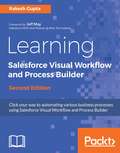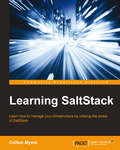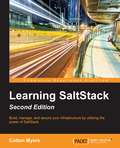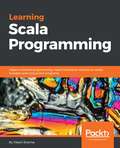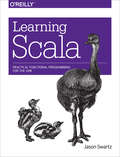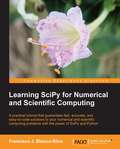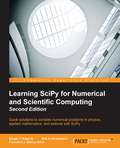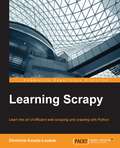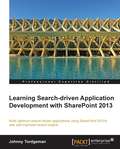- Table View
- List View
Learning SAP BusinessObjects Dashboards
by Taha M. MahmoudThis book will help beginners to create stylish and professional looking dashboards in no time. It is also intended for BI developers who want to use SAP BO to facilitate BI in their organizations. No prior knowledge is required, however, you must have a basic knowledge of MS Excel and some analytical skills to build expressive business charts.
Learning SAS by Example: A Programmer's Guide
by Ron CodyLearn to program SAS by example! Learning SAS by Example: A Programmer’s Guide, Second Edition, teaches SAS programming from very basic concepts to more advanced topics. Because most programmers prefer examples rather than reference-type syntax, this book uses short examples to explain each topic. The second edition has brought this classic book on SAS programming up to the latest SAS version, with new chapters that cover topics such as PROC SGPLOT and Perl regular expressions. This book belongs on the shelf (or e-book reader) of anyone who programs in SAS, from those with little programming experience who want to learn SAS to intermediate and even advanced SAS programmers who want to learn new techniques or identify new ways to accomplish existing tasks. <P><P>In an instructive and conversational tone, author Ron Cody clearly explains each programming technique and then illustrates it with one or more real-life examples, followed by a detailed description of how the program works. The text is divided into four major sections: Getting Started, DATA Step Processing, Presenting and Summarizing Your Data, and Advanced Topics. Subjects addressed include
Learning SD-WAN with Cisco: Transform Your Existing WAN Into a Cost-effective Network
by Stuart FordhamExplore the rise of SD-WAN with CISCO and transform your existing WAN into an agile, efficient, and cost-effective network. Learning SD-WAN with Cisco helps you understand the development of SD-WAN and its benefits to modern networks. This book starts with an exploration of the different components of SD-WAN, such as vBond for orchestration, vManage for management, vSmart for control, and the vEdge devices. From there, it moves on to building a network from the ground up using EVE-NG, focusing on how to install EVE-NG, get the required licenses via a SmartNET account, download the components, and begin to create your network by installing vManage.Once you have this foundation, you will create the organization and certificates, and look at local users as well as single- and multi-tenancy options and clustering. As you continue to build your network, you will dig down into the overlay protocols used in SD-WAN, and then deploy your controllers and edge devices, looking at zero-touch provisioning along the way.After building your network, you will configure and apply policies and templates to manage the control and data planes as well as VPNs, Internet access, security, and quality of service. The book also explores reporting and management using vManage, along with upgrading and troubleshooting the various components, using techniques from simple ping and trace route through to advanced techniques such as DTLS and TLOC troubleshooting and traffic simulation.After reading this book, you will have hands-on experience working with SD-WAN. You will understand how to deploy, configure, manage, and troubleshoot it.What You Will LearnKnow what SD-WAN is, how it came about, and why we need itUnderstand troubleshooting and traffic simulation of DTLS and TLOC Monitor, report, and troubleshoot the SD-WAN environment Who This Book Is For Network professionals with experience in Linux and Cisco devices
Learning SPARQL
by Bob DuCharmeGet hands-on experience with SPARQL, the RDF query language that's become a key component of the semantic web. With this concise book, you will learn how to use the latest version of this W3C standard to retrieve and manipulate the increasing amount of public and private data available via SPARQL endpoints. Several open source and commercial tools already support SPARQL, and this introduction gets you started right away.Begin with how to write and run simple SPARQL 1.1 queries, then dive into the language's powerful features and capabilities for manipulating the data you retrieve. Learn what you need to know to add to, update, and delete data in RDF datasets, and give web applications access to this data.Understand SPARQL’s connection with RDF, the semantic web, and related specificationsQuery and combine data from local and remote sourcesCopy, convert, and create new RDF dataLearn how datatype metadata, standardized functions, and extension functions contribute to your queriesIncorporate SPARQL queries into web-based applications
Learning SPARQL: Querying and Updating with SPARQL 1.1
by Bob DuCharmeGain hands-on experience with SPARQL, the RDF query language that’s bringing new possibilities to semantic web, linked data, and big data projects. This updated and expanded edition shows you how to use SPARQL 1.1 with a variety of tools to retrieve, manipulate, and federate data from the public web as well as from private sources.Author Bob DuCharme has you writing simple queries right away before providing background on how SPARQL fits into RDF technologies. Using short examples that you can run yourself with open source software, you’ll learn how to update, add to, and delete data in RDF datasets.Get the big picture on RDF, linked data, and the semantic webUse SPARQL to find bad data and create new data from existing dataUse datatype metadata and functions in your queriesLearn techniques and tools to help your queries run more efficientlyUse RDF Schemas and OWL ontologies to extend the power of your queriesDiscover the roles that SPARQL can play in your applications
Learning SQL
by Alan BeaulieuUpdated for the latest database management systems -- including MySQL 6.0, Oracle 11g, and Microsoft's SQL Server 2008 -- this introductory guide will get you up and running with SQL quickly. Whether you need to write database applications, perform administrative tasks, or generate reports, Learning SQL, Second Edition, will help you easily master all the SQL fundamentals. Each chapter presents a self-contained lesson on a key SQL concept or technique, with numerous illustrations and annotated examples. Exercises at the end of each chapter let you practice the skills you learn. With this book, you will: Move quickly through SQL basics and learn several advanced features Use SQL data statements to generate, manipulate, and retrieve data Create database objects, such as tables, indexes, and constraints, using SQL schema statements Learn how data sets interact with queries, and understand the importance of subqueries Convert and manipulate data with SQL's built-in functions, and use conditional logic in data statements Knowledge of SQL is a must for interacting with data. With Learning SQL, you'll quickly learn how to put the power and flexibility of this language to work.
Learning SQL
by Alan BeaulieuSQL (Structured Query Language) is a standard programming language for generating, manipulating, and retrieving information from a relational database. If you're working with a relational database--whether you're writing applications, performing administrative tasks, or generating reports--you need to know how to interact with your data. Even if you are using a tool that generates SQL for you, such as a reporting tool, there may still be cases where you need to bypass the automatic generation feature and write your own SQL statements.To help you attain this fundamental SQL knowledge, look to Learning SQL, an introductory guide to SQL, designed primarily for developers just cutting their teeth on the language. Learning SQL moves you quickly through the basics and then on to some of the more commonly used advanced features. Among the topics discussed:The history of the computerized databaseSQL Data Statements--those used to create, manipulate, and retrieve data stored in your database; example statements include select, update, insert, and deleteSQL Schema Statements--those used to create database objects, such as tables, indexes, and constraintsHow data sets can interact with queriesThe importance of subqueriesData conversion and manipulation via SQL's built-in functionsHow conditional logic can be used in Data StatementsBest of all, Learning SQL talks to you in a real-world manner, discussing various platform differences that you're likely to encounter and offering a series of chapter exercises that walk you through the learning process. Whenever possible, the book sticks to the features included in the ANSI SQL standards. This means you'll be able to apply what you learn to any of several different databases; the book covers MySQL, Microsoft SQL Server, and Oracle Database, but the features and syntax should apply just as well (perhaps with some tweaking) to IBM DB2, Sybase Adaptive Server, and PostgreSQL.Put the power and flexibility of SQL to work. With Learning SQL you can master this important skill and know that the SQL statements you write are indeed correct.
Learning SQL Server 2008 Reporting Services
by Jayaram KrishnaswamyWith clear instructions and plenty of screenshots, this book provides all the support and guidance you will need as you begin to generate reports with SQL Server 2008 Reporting Services. This book is for anyone who is new to SQL Server 2008 Reporting Services and needs to create and deploy reports. The book is suitable for report developers, data analysts, and report server database administrators. You will need to know the basic concepts of SQL Server, but not necessarily be very familiar with SQL Server 2008.
Learning SQL Server Reporting Services 2012
by Jayaram KrishnaswamyThe book is packed with clear instructions and plenty of screenshots, providing all the support and guidance you will need as you begin to generate reports with SQL Server 2012 Reporting Services.This book is for those who are new to SQL Server Reporting Services 2012 and aspiring to create and deploy cutting edge reports. This book is for report developers, report authors, ad-hoc report authors and model developers, and Report Server and SharePoint Server Integrated Report Server administrators. Minimal knowledge of SQL Server is assumed and SharePoint experience would be helpful.
Learning SQL on SQL Server 2005
by Sikha Saha Bagui Richard Walsh EarpAnyone who interacts with today's modern databases needs to know SQL (Structured Query Language), the standard language for generating, manipulating, and retrieving database information. In recent years, the dramatic rise in the popularity of relational databases and multi-user databases has fueled a healthy demand for application developers and others who can write SQL code efficiently and correctly. If you're new to databases, or need a SQL refresher, Learning SQL on SQL Server 2005 is an ideal step-by-step introduction to this database query tool, with everything you need for programming SQL using Microsoft's SQL Server 2005-one of the most powerful and popular database engines used today. Plenty of books explain database theory. This guide lets you apply the theory as you learn SQL. You don't need prior database knowledge, or even prior computer knowledge. Based on a popular university-level course designed by authors Sikha Saha Bagui and Richard Walsh Earp, Learning SQL on SQL Server 2005 starts with very simple SQL concepts, and slowly builds into more complex query development. Every topic, concept, and idea comes with examples of code and output, along with exercises to help you gain proficiency in SQL and SQL Server 2005. With this book, you'll learn:Beginning SQL commands, such as how and where to type an SQL query, and how to create, populate, alter and delete tablesHow to customize SQL Server 2005's settings and about SQL Server 2005's functionsAbout joins, a common database mechanism for combining tablesQuery development, the use of views and other derived structures, and simple set operationsSubqueries, aggregate functions and correlated subqueries, as well as indexes and constraints that can be added to tables in SQL Server 2005 Whether you're an undergraduate computer science or MIS student, a self-learner who has access to the new Microsoft database, or work for your company's IT department, Learning SQL on SQL Server 2005 will get you up to speed on SQL in no time.
Learning SQL: Generate, Manipulate, and Retrieve Data
by Alan BeaulieuAs data floods into your company, you need to put it to work right away—and SQL is the best tool for the job. With the latest edition of this introductory guide, author Alan Beaulieu helps developers get up to speed with SQL fundamentals for writing database applications, performing administrative tasks, and generating reports. You’ll find new chapters on SQL and big data, analytic functions, and working with very large databases.Each chapter presents a self-contained lesson on a key SQL concept or technique using numerous illustrations and annotated examples. Exercises let you practice the skills you learn. Knowledge of SQL is a must for interacting with data. With Learning SQL, you’ll quickly discover how to put the power and flexibility of this language to work.Move quickly through SQL basics and several advanced featuresUse SQL data statements to generate, manipulate, and retrieve dataCreate database objects, such as tables, indexes, and constraints with SQL schema statementsLearn how datasets interact with queries; understand the importance of subqueriesConvert and manipulate data with SQL’s built-in functions and use conditional logic in data statements
Learning SQL: Master SQL Fundamentals
by Alan BeaulieuUpdated for the latest database management systems -- including MySQL 6.0, Oracle 11g, and Microsoft's SQL Server 2008 -- this introductory guide will get you up and running with SQL quickly. Whether you need to write database applications, perform administrative tasks, or generate reports, Learning SQL, Second Edition, will help you easily master all the SQL fundamentals.Each chapter presents a self-contained lesson on a key SQL concept or technique, with numerous illustrations and annotated examples. Exercises at the end of each chapter let you practice the skills you learn. With this book, you will:Move quickly through SQL basics and learn several advanced featuresUse SQL data statements to generate, manipulate, and retrieve dataCreate database objects, such as tables, indexes, and constraints, using SQL schema statementsLearn how data sets interact with queries, and understand the importance of subqueriesConvert and manipulate data with SQL's built-in functions, and use conditional logic in data statementsKnowledge of SQL is a must for interacting with data. With Learning SQL, you'll quickly learn how to put the power and flexibility of this language to work.
Learning SQLite for iOS
by Msc Gene Da RochaExtend SQLite with mobile development skills to build great apps for iOS devices About This Book * Implement Swift code using SQLite statements * Learn the background to SQL and SQLite for mobile development, its statements, and command features through practical examples * Extend the standard SQLite functionality and increase your software creation portfolio Who This Book Is For This book is intended for those who want to learn about SQLite and how to develop apps in Swift or HTML5 using SQLite. Whether you are an expert Objective-C programmer or new to this platform, you'll learn quickly, grasping the code in real-world apps to use Swift. What You Will Learn * Explore Swift's basic language statements * Connect to SQLite and execute SQL statements * Extend the SQLite language to create your own software extensions * Use HTML5 with Phonegap on iOS * Set up a Swift project using XCode with SQLite * Administer SQLite databases in an easy and effective way In Detail The ability to use SQLite with iOS provides a great opportunity to build amazing apps. Apple's iOS SDK provides native support for SQLite databases. This combination offers the potential to create powerful, data-persistent applications. This book starts with the architecture of SQLite database and introduces you to concepts in SQL . You will find yourself equipped to design your own database system, administer it, and maintain it. Further, you will learn how to operate your SQLite databases smoothly using SQL commands. You will be able to extend the functionality of SQLite by using its vast arsenal of C API calls to build some interesting, exciting, new, and intelligent data-driven applications. Understand how Xcode, HTML5, and Phonegap can be used to build a cross-platform modern app which can benefit from all these technologies - all through creating a complete, customizable application skeleton that you can build on for your own apps. Style and approach This book is a practical and comprehensive guide to developing applications using SQLite and iOS.
Learning Salesforce Einstein
by Mohith ShrivastavaIncorporate the power of Einstein in your Salesforce application About This Book • Make better predictions of your business processes using prediction and predictive modeling • Build your own custom models by leveraging PredictionIO on the Heroku platform • Integrate Einstein into various cloud services to predict sales, marketing leads, insights into news feeds, and more Who This Book Is For This book is for developers, data scientists, and Salesforce-experienced consultants who want to explore Salesforce Einstein and its current offerings. It assumes some prior experience with the Salesforce platform. What You Will Learn • Get introduced to AI and its role in CRM and cloud applications • Understand how Einstein works for the sales, service, marketing, community, and commerce clouds • Gain a deep understanding of how to use Einstein for the analytics cloud • Build predictive apps on Heroku using PredictionIO, and work with Einstein Predictive Vision Services • Incorporate Einstein in the IoT cloud • Test the accuracy of Einstein through Salesforce reporting and Wave analytics In Detail Dreamforce 16 brought forth the latest addition to the Salesforce platform: an AI tool named Einstein. Einstein promises to provide users of all Salesforce applications with a powerful platform to help them gain deep insights into the data they work on. This book will introduce you to Einstein and help you integrate it into your respective business applications based on the Salesforce platform. We start off with an introduction to AI, then move on to look at how AI can make your CRM and apps smarter. Next, we discuss various out-of-the-box components added to sales, service, marketing, and community clouds from salesforce to add Artificial Intelligence capabilities. Further on, we teach you how to use Heroku, PredictionIO, and the force.com platform, along with Einstein, to build smarter apps. The core chapters focus on developer content and introduce PredictionIO and Salesforce Einstein Vision Services. We explore Einstein Predictive Vision Services, along with analytics cloud, the Einstein Data Discovery product, and IOT core concepts. Throughout the book, we also focus on how Einstein can be integrated into CRM and various clouds such as sales, services, marketing, and communities. By the end of the book, you will be able to embrace and leverage the power of Einstein, incorporating its functions to gain more knowledge. Salesforce developers will be introduced to the world of AI, while data scientists will gain insights into Salesforce's various cloud offerings and how they can use Einstein's capabilities and enhance applications. Style and approach This book takes a straightforward approach to explain Salesforce Einstein and all of its potential applications. Filled with examples, the book presents the facts along with seasoned advice and real-world use cases to ensure you have all the resources you need to incorporate the power of Einstein in your work.
Learning Salesforce Lightning Application Development: Build and test Lightning Components for Salesforce Lightning Experience using Salesforce DX
by Mohith ShrivastavaBuild, design, and style beautiful and informative applications on the Salesforce Lightning platformKey FeaturesBuild and Test Lightning Components that enhance application usability and adaptabilityApply Security Best Practices to your Custom Lightning ComponentsDesign Lightning Components for Salesforce UIs such as Lightning Pages, Salesforce 1 Application, Communities, and more.Book DescriptionBuilt on the Salesforce App Cloud, the new Salesforce Lightning Experience combines three major components: Lightning Design System, Lightning App Builder, and Lightning Components, to provide an enhanced user experience. This book will enable you to quickly create modern, enterprise apps with Lightning Component Framework.You will start by building simple Lightning Components and understanding the Lightning Components architecture. The chapters cover the basics of Lightning Component Framework semantics and syntax, the security features provided by Locker Service, and use of third-party libraries inside Lightning Components. The later chapters focus on debugging, performance tuning, testing using Lightning Testing Services, and how to publish Lightning Components on Salesforce AppExchange.What you will learnUnderstand Lightning Components architecture Learn Locker security best practices Debug and Improve performance of your Lightning Components Use third-party libraries along with Lightning Component FrameworkLearn how to publish Lightning Components on AppExchangeUse Lightning Out to take your Lightning Components outside the Salesforce platformWho this book is forThis book is for Salesforce developers or developers from other platforms who are familiar with HTML, CSS, and JavaScript and want to build and test Salesforce Lightning components. No knowledge of Salesforce Lightning is required.
Learning Salesforce Visual Workflow
by Rakesh GuptaLearning Salesforce Visual Workflow is intended for those who want to use Flows to automate their business requirements by click not code. Salesforce maintains an incredibly user-friendly interface; no previous experience in computer coding or programming is required.
Learning Salesforce Visual Workflow and Process Builder - Second Edition
by Rakesh GuptaClick your way to automating various business processes using Salesforce Visual Workflow About This Book • Develop an application using Point and Click with the help of Flow • Get to grips with various ways to launch a Flow • Capture data from an external user without using the Visualforce page • Save user input into the database, and learn how to query and manipulate the data • Discover various ways to debug and deploy Flow and Process Builder • Understand the concepts of Subflow and Login Flow • Handle complex business processes using Process builder and keep them clean • Use existing or new Flows to work with Salesforce Lightning Experience. Who This Book Is For This book is intended for those who want to use Flows to automate their business requirements by clicking, not coding. No previous experience in computer coding or programming is required. What You Will Learn • Develop an application using point and click with the help of Flow • Get to grips with various ways to launch a Flow • Capture data from an external user without using the Visualforce page • Save user input into the database, and learn how to query and manipulate the data • Discover various ways to debug and deploy Flow and Process Builder • Understand the concepts of Subflow and Login Flow • Handle complex business processes using Process builder and keep them clean • Use existing or new Flows to work with Salesforce Lightning Experience. In Detail Salesforce Management System is an information system used in CRM to automate the business processes like sales and marketing. To implement this, Force.com developed a powerful tool called Visual Workflow to automate business processes by creating applications also called Flows. Learning Salesforce Visual Workflow, Second Edition is a practical guide on Flows that will enable you to develop custom applications in Salesforce with minimized code usage. The book starts with an introduction to Visual Workflows that teaches all the building blocks of creating Flows and use it efficiently. You will learn how to easily automate business processes and tackle complex business scenarios using Flows. The book explains the working of the Process Builder so you can create reusable processes. The book also covers how you can integrate existing or newly created Flows with the Salesforce Lightening Experience. By the end of the book, you will get a clear understanding on how to use Flows and Process Builder in your organization to optimize code usage. Style and approach Step by step approch to use Process Builder to solve complex business requirements with the help of Flow
Learning SaltStack
by Colton MyersIf you are a system administrator who manages multiple servers, then you know how difficult it is to keep your infrastructure in line. If you've been searching for an easier way, this book is for you. No prior experience with SaltStack is required.
Learning SaltStack - Second Edition
by Colton MyersBuild, manage, and secure your infrastructure by utilizing the power of SaltStack About This Book * First book in the market to incorporate all the latest features of SaltStack. * Leverage the power of SaltStack for building, managing and securing your infrastructure. * Effectively use commands and control the state of your infrastructure in a jiffy. Who This Book Is For This book is aimed at System Administrators who are looking forward to manage their infrastructure using SaltStack with no prior knowledge about it. What You Will Learn Install Salt on your servers Run commands on all or some of your minions instantly from a central managing server Write custom Salt modules to handle your infrastructure's unique needs Define the state of your infrastructure and use Salt to enforce that state. Create platform-agnostic state definitions for greater flexibility and power Manage virtual servers on public or private clouds using Salt Cloud Use the event system in Salt to create a reactive and self-healing infrastructure In Detail SaltStack is one of the best infrastructure management platforms available. It provides powerful tools for defining and enforcing the state of your infrastructure in a clear, concise way. With this book learn how to use these tools for your own infrastructure by understanding the core pieces of Salt. In this book we will take you from the initial installation of Salt, through running their first commands, and then talk about extending Salt for individual use cases. From there you will explore the state system inside of Salt, learning to define the desired state of our infrastructure in such a way that Salt can enforce that state with a single command. Finally, you will learn about some of the additional tools that salt provides, including salt-cloud, the reactor, and the event system. We?ll finish by exploring how to get involved with salt and what?s new in the salt community. Finally, by the end of the book, you'll be able to build a reliable, scalable, secure, high-performance infrastructure and fully utilize the power of cloud computing. Style and approach This will be a comprehensive guide on SaltStack along with installation and setting up of Salt on couple of platforms. Then enlightening the readers about remote execution system and configuration management system and ending with concepts of security and best practices.
Learning Scala Programming: Object-oriented programming meets functional reactive to create Scalable and Concurrent programs
by Vikash SharmaLearn how to write scalable and concurrent programs in Scala, a language that grows with you. Key Features Get a grip on the functional features of the Scala programming language Understand and develop optimal applications using object-oriented and functional Scala constructs Learn reactive principles with Scala and work with the Akka framework Book Description Scala is a general-purpose programming language that supports both functional and object-oriented programming paradigms. Due to its concise design and versatility, Scala's applications have been extended to a wide variety of fields such as data science and cluster computing. You will learn to write highly scalable, concurrent, and testable programs to meet everyday software requirements. We will begin by understanding the language basics, syntax, core data types, literals, variables, and more. From here you will be introduced to data structures with Scala and you will learn to work with higher-order functions. Scala's powerful collections framework will help you get the best out of immutable data structures and utilize them effectively. You will then be introduced to concepts such as pattern matching, case classes, and functional programming features. From here, you will learn to work with Scala's object-oriented features. Going forward, you will learn about asynchronous and reactive programming with Scala, where you will be introduced to the Akka framework. Finally, you will learn the interoperability of Scala and Java. After reading this book, you'll be well versed with this language and its features, and you will be able to write scalable, concurrent, and reactive programs in Scala. What you will learn Get to know the reasons for choosing Scala: its use and the advantages it provides over other languages Bring together functional and object-oriented programming constructs to make a manageable application Master basic to advanced Scala constructs Test your applications using advanced testing methodologies such as TDD Select preferred language constructs from the wide variety of constructs provided by Scala Make the transition from the object-oriented paradigm to the functional programming paradigm Write clean, concise, and powerful code with a functional mindset Create concurrent, scalable, and reactive applications utilizing the advantages of ScalaWho this book is for This book is for programmers who choose to get a grip over Scala to write concurrent, scalable, and reactive programs. No prior experience with any programming language is required to learn the concepts explained in this book. Knowledge of any programming language would help the reader understanding concepts faster though.
Learning Scala: Practical Functional Programming for the JVM
by Jason SwartzWhy learn Scala? You don’t need to be a data scientist or distributed computing expert to appreciate this object-oriented functional programming language. This practical book provides a comprehensive yet approachable introduction to the language, complete with syntax diagrams, examples, and exercises. You’ll start with Scala's core types and syntax before diving into higher-order functions and immutable data structures.Author Jason Swartz demonstrates why Scala’s concise and expressive syntax make it an ideal language for Ruby or Python developers who want to improve their craft, while its type safety and performance ensures that it’s stable and fast enough for any application.Learn about the core data types, literals, values, and variablesDiscover how to think and write in expressions, the foundation for Scala's syntaxWrite higher-order functions that accept or return other functionsBecome familiar with immutable data structures and easily transform them with type-safe and declarative operationsCreate custom infix operators to simplify existing operations or even to start your own domain-specific languageBuild classes that compose one or more traits for full reusability, or create new functionality by mixing them in at instantiation
Learning SciPy for Numerical and Scientific Computing
by Francisco J. Blanco-SilvaA step-by-step practical tutorial with plenty of examples on research-based problems from various areas of science, that prove how simple, yet effective, it is to provide solutions based on SciPy.This book is targeted at anyone with basic knowledge of Python, a somewhat advanced command of mathematics/physics, and an interest in engineering or scientific applications---this is broadly what we refer to as scientific computing.This book will be of critical importance to programmers and scientists who have basic Python knowledge and would like to be able to do scientific and numerical computations with SciPy.
Learning SciPy for Numerical and Scientific Computing - Second Edition
by Sergio J. Rojas G. Erik A ChristensenThis book targets programmers and scientists who have basic Python knowledge and who are keen to perform scientific and numerical computations with SciPy.
Learning Scrapy
by Dimitris Kouzis LoukasIf you are a software developer, data scientist, NLP or machine-learning enthusiast or just need to migrate your company's wiki from a legacy platform, then this book is for you. It is perfect for someone , who needs instant access to large amounts of semi-structured data effortlessly.
Learning Search-driven Application Development with SharePoint 2013
by Johnny TordgemanA fast paced, practical guide, filled with code examples and demonstrations of enterprise search using SharePoint 2013.This book is written for SharePoint and JavaScript developers who want to get started with SharePoint search and create search-driven applications. The book assumes working knowledge with previous versions of SharePoint and some experience with JavaScript and client side development
